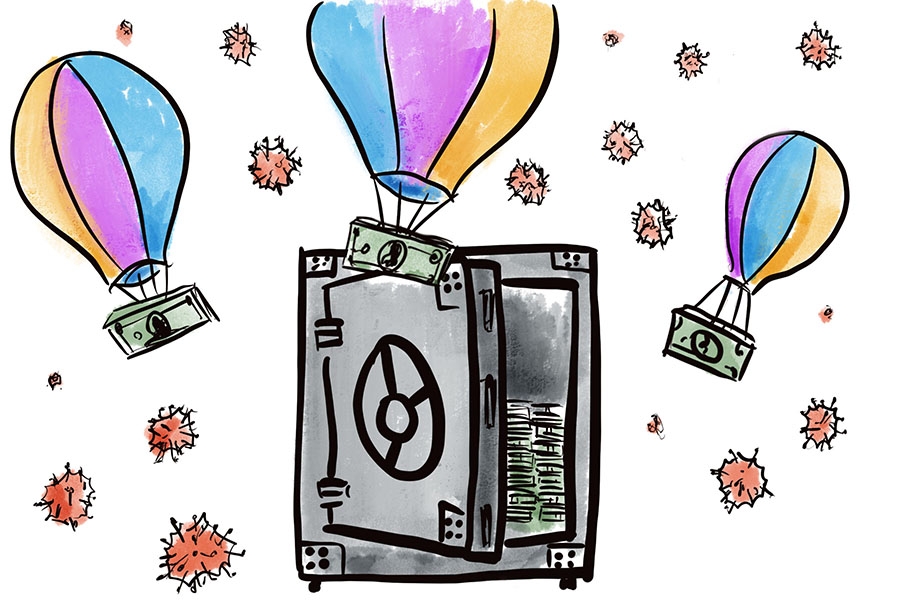A community bank describes lending options for small businesses and nonprofits impacted by COVID-19.
As companies are forced to close or stop production to stem contagion from COVID-19, banks have been advising businesses on their lending options.
A variety of financial aid programs are available. Congress is debating a $1.8 trillion stimulus package that would help small businesses pay workers.
The Small Business Administration has a specific program that provides low-interest loans to small businesses and nonprofits that are losing revenue because of forced closures.
Jeff Bertalotto, Columbia Bank senior vice president and commercial banking market manager for Oregon, describes what the financial options are for clients facing a cash crunch.
OB: To what extent is Columbia Bank seeing an increase in requests for loans as a direct result of the fallout from the coronavirus?
Jeff Bertalotto: Columbia Bank is actively reaching out to our customers and helping them assess their needs as they evolve during this challenging time.
Business impacts from the coronavirus are widespread: Supply chains are disrupted and several businesses are closed to limit spread of the virus. Cash flow is impacted, and companies may have trouble meeting payroll, vendor payments, rent or lease obligations and term debt requirements, among other obligations.
We are fielding an increase in requests from businesses of all sizes. Columbia Bank is working with them to identify the best credit options and providing financial planning guidance to help them weather this public health crisis.
O.B.: What is your bank’s lending strategy as a result of the coronavirus?
J.B.: Columbia Bank teams are regularly communicating and engaged with our clients, and we are well-capitalized and well-positioned to continue lending and helping our customers work through this. Our strategy is to continue responsibly lending throughout this difficult time.
Columbia bankers are discussing with our clients the adequacy of their lines of credit and their cash flow situations to determine if additional credit line availability is a good option or if payment deferrals are necessary.
Columbia Bank is the leading Small Business Administration (SBA) lender in Oregon, so we expect to utilize our expertise to provide solutions in this area.
Columbia’s SBA team is currently focused primarily on economic injury disaster loans, which are low-interest, direct loans from the SBA to the business.
Other resources are evolving, such as higher guarantees under the SBA 7a program [a financial assistance program for small businesses] and fee waivers for borrowers.
O.B.: Which clients are in most need of loans as a result of the fallout from the virus?
J.B.: Businesses directly impacted by the decrease in social activity and travel – including restaurants, hotels and aviation – are in the greatest need of immediate loans.
But it is too early to rule out any business. Small, medium and large business have reported impacts from the recent events. There may be some that don’t experience significant ramifications, but they likely will be in the minority.
Others affected: family entertainment establishments, tribal gaming operations, dentists, veterinarians, manufacturers, ag-related companies and real estate owners.
O.B.: To what extent are you increasing your lending capacity as a result of coronavirus issues?
J.B.: Columbia Bank is fully committed to meeting the banking needs of our local communities. Columbia teams are communicating regulatory with the Small Business Administration and other federal officials to ensure we have up-to-date information about new emergency loan programs currently being ironed out in Washington, D.C.
As soon as those programs are rolled out, we expect to be able to present and explain all available options to our clients.
O.B.: What is your financial advice to small businesses that are in a cash crunch because of closures, reduced demand, reduced production, etc.?
J.B.: Communicate with your banker about short- and medium-term products and strategies to help your business weather this storm. Notably, federal lawmakers are currently working on emergency lending programs to empower the Small Business Administration to make billions of dollars in low-interest loans to small businesses affected by the coronavirus pandemic.
Details are still being finalized, but our SBA experts can help expedite applications for emergency SBA loans and assess other near-term credit needs.
Important questions for business owners to consider: How much cash is on hand, including credit available under current lines of credit; Are daily operations depleting cash reserves and at what pace? If needed, identify changes that you may need to make, even if such actions may prove difficult.
Assess your receivables: When will you get paid? What trade obligations do you have and when? What are your near-term debt obligations for items such as equipment? What are your personal reserve options such as home equity lines of credit?









